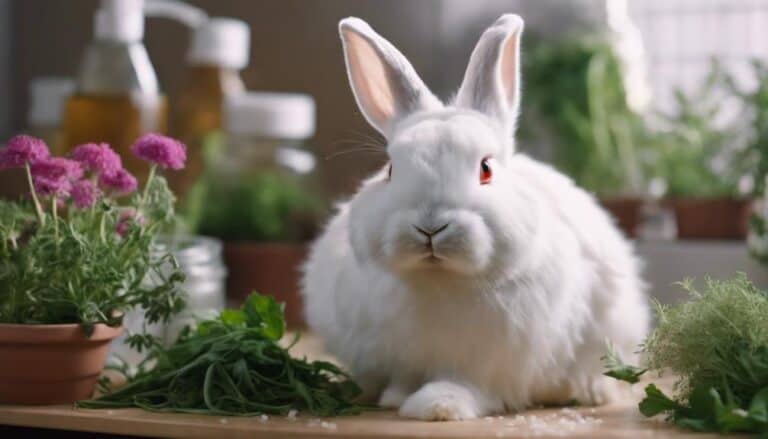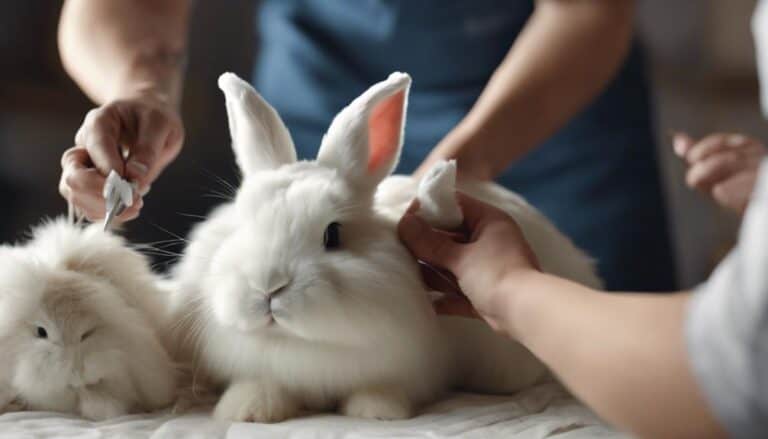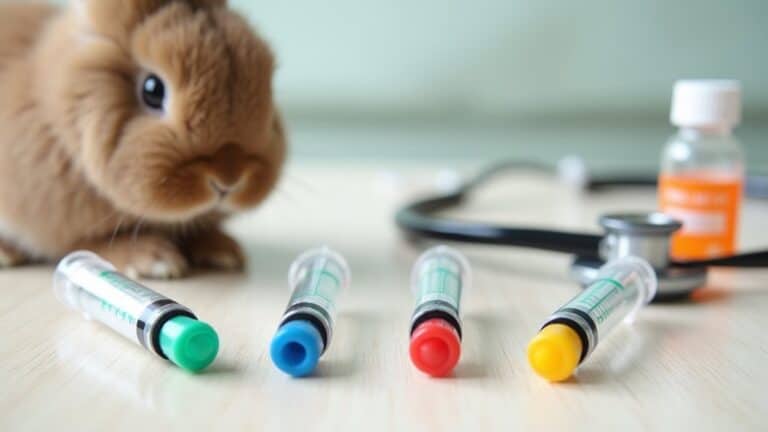If you've ever wondered which vaccinations are essential for your pet rabbit's health, explore no more. Understanding the top vaccinations for pet rabbits is paramount in safeguarding their well-being.
From preventing fatal diseases like Rabbit Hemorrhagic Disease Virus (RHDV) to ensuring overall longevity, these vaccinations play a pivotal role in your bunny's care.
But what exactly do these vaccinations entail, and how can they benefit your furry companion? Let's delve into the world of rabbit vaccinations and their significance in maintaining a healthy and happy pet.
Contents
- 1 Key Takeaways
- 2 Myxomatosis Vaccination for Rabbits
- 3 RHDV Vaccination Importance
- 4 Understanding RHDV2 Vaccinations
- 5 Combating Viral Haemorrhagic Diseases
- 6 Essential Vaccines for Pet Rabbits
- 7 Establishing a Rabbit Vaccination Schedule
- 8 Vaccination Costs and Considerations
- 9 Which vaccinations are necessary for child-friendly bunny breeds?
- 10 Frequently Asked Questions
- 11 Conclusion
Key Takeaways
- Myxomatosis and RHDV vaccinations are crucial for protecting pet rabbits from fatal viral infections.
- Understanding RHDV2 vaccines is essential for maintaining a rabbit's health and well-being.
- Prevention measures like vaccination, hygiene, and quarantine help safeguard rabbits from RHDV2 transmission.
- Regular vaccination schedules tailored by a rabbit-savvy vet are vital for long-term immunity and health maintenance.
Myxomatosis Vaccination for Rabbits
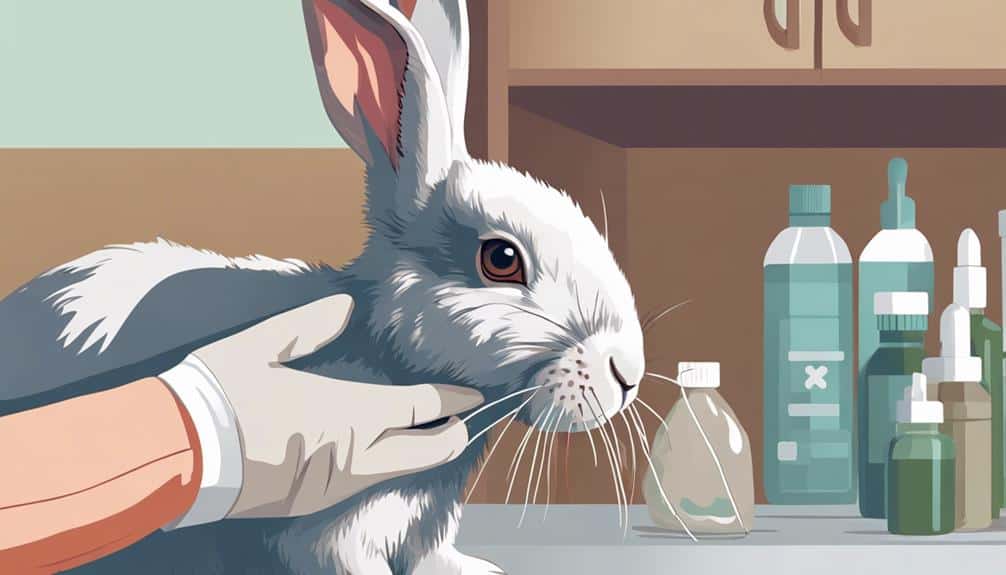
To protect your pet rabbit from the widespread and often fatal disease of myxomatosis, vaccination is important. Myxomatosis is a severe viral infection that's commonly spread through blood-sucking insects, rabbit-to-rabbit contact, and environmental contamination. Symptoms of myxomatosis include puffy swellings around the head and genitals, blindness, high fever, and difficulty eating and drinking. Without specific treatment, myxomatosis can lead to death within 10-14 days of infection.
Vaccination against myxomatosis is crucial for your rabbit's protection. The vaccine helps in reducing the severity of the disease if your rabbit does contract it. Vaccinated rabbits have a much better chance of recovery compared to those without the vaccine. It's essential to make sure that your rabbit receives the vaccination to safeguard its health and well-being. Protecting your rabbit from myxomatosis through vaccination is one of the best ways to ensure a long and healthy life for your beloved pet.
RHDV Vaccination Importance
Ensuring your pet rabbit receives the RHDV vaccination is paramount to protecting it from the high mortality rate associated with this dangerous disease. Rabbit Hemorrhagic Disease Virus (RHDV) poses a significant threat to rabbits, with the emergence of the RHDV2 variant amplifying this risk. The RHDV2 variant offers a commendable 90% protection rate when administered correctly, greatly boosting your rabbit's immunity against this lethal virus.
RHDV2 spreads through direct contact or exposure to contaminated environments, making prevention through vaccination critical. This variant has been identified as particularly hazardous, affecting rabbit livers and leading to a rapid onset of symptoms that often prove fatal. By vaccinating your rabbit against RHDV, you provide it with a strong defense mechanism against this perilous disease.
Don't underestimate the importance of RHDV vaccination for safeguarding your furry companion's well-being. It's a proactive measure that can offer substantial protection, potentially saving your rabbit from severe illness or even untimely death.
Understanding RHDV2 Vaccinations
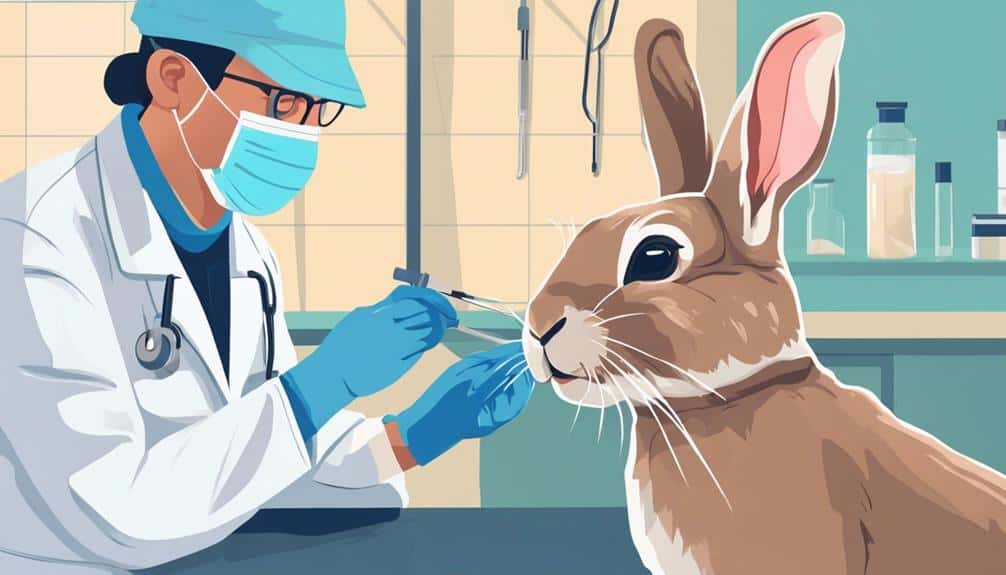
To maintain your rabbit's health, understanding RHDV2 vaccinations is essential.
Learn how to prevent transmission, the duration of vaccine effectiveness, and the recommended booster schedule.
Stay informed to protect your furry friend from this deadly virus.
RHDV2 Transmission Prevention
Preventing the transmission of RHDV2 through proper vaccination is important in safeguarding your pet rabbit's health and well-being. To effectively prevent the spread of this contagious calicivirus, consider the following steps:
- Guarantee: Guarantee your rabbit receives the RHDV2 vaccine to build immunity.
- Limit Direct Contact: Minimize contact with wild rabbits and those of unknown health status.
- Maintain Hygiene: Keep living areas clean and sanitized to reduce the risk of contamination.
- Quarantine New Rabbits: Quarantine new additions for at least two weeks to prevent potential disease transmission.
Vaccine Effectiveness Duration
To fully understand the protection provided by RHDV2 vaccinations, it's important to grasp the duration of effectiveness these vaccines offer for your pet rabbit's health.
RHDV2 vaccines can provide up to 90% protection and remain effective for at least one year. Annual boosters are necessary to maintain immunity levels in your rabbit. These vaccines are safe to administer even to rabbits as young as 28 days old.
However, it's essential to combine vaccination with good biosecurity practices to guarantee the overall health and well-being of your pet.
Boosters and Schedule
Boosters for RHDV2 vaccinations play an important role in maintaining immunity levels for your pet rabbit's health. Here's a guide to help you understand the schedule:
- Guarantee at least two booster doses, with a minimum gap of three weeks between each.
- An annual booster shot is necessary to uphold immunity against RHDV2.
- The RHDV2 vaccine can be administered safely to rabbits as young as 28 days old.
- Implement good biosecurity practices alongside vaccination to protect your rabbit from RHDV2 and other diseases.
Combating Viral Haemorrhagic Diseases
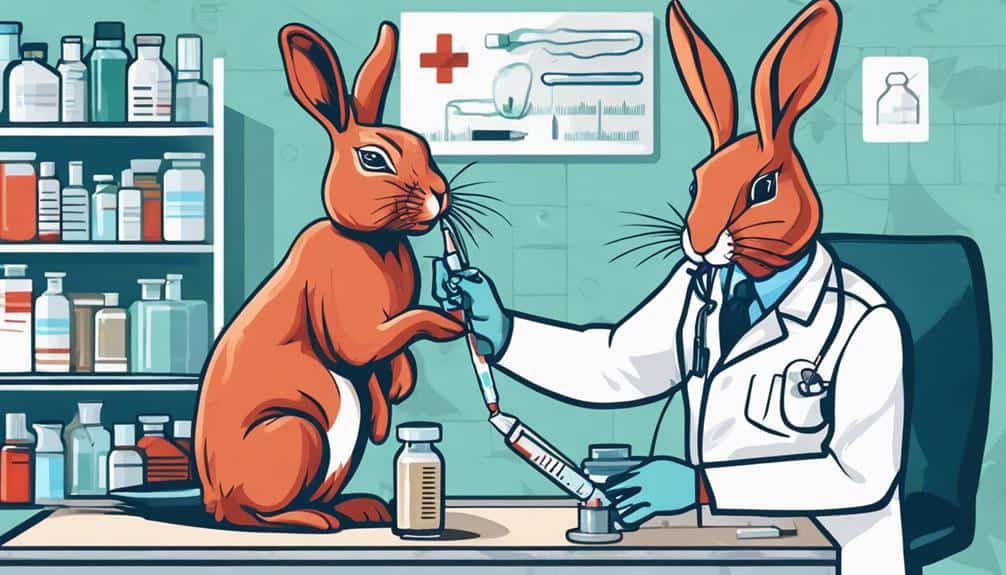
When combating viral haemorrhagic diseases like RHDV2 in your pet rabbits, focus on preventing virus transmission through proper vaccination. Understanding the importance of a strict vaccination schedule is essential to safeguard your rabbits against these deadly diseases.
Recognizing symptoms early and seeking prompt treatment can greatly improve their chances of recovery.
Virus Transmission Prevention
Preventing the spread of viral haemorrhagic diseases, such as RHDV, requires diligent vaccination and strict adherence to biosecurity measures. To combat these diseases effectively, follow these steps:
- Immunization: Make sure your rabbit is immunized against specific viral strains like RHDV and RHDV2.
- Biosecurity: Practice good biosecurity measures, including avoiding contact with wild rabbits and contaminated environments.
- Transmission Routes: Be aware that transmission can occur through direct contact, contaminated surfaces, and blood-sucking insects.
- Regular Boosters: Schedule regular vaccinations and boosters to maintain immunity and protect your pet rabbit from viral haemorrhagic diseases.
Vaccination Schedule Importance
Properly timing and administering vaccinations is essential in safeguarding your pet rabbit against viral hemorrhagic diseases like Rabbit Hemorrhagic Disease (RHD) and Myxomatosis. Timely vaccinations, such as vaccinating kits at 10-12 weeks and providing annual boosters, play an important role in ensuring long-term immunity.
Consulting a rabbit-savvy vet is critical to receive personalized guidance on the appropriate vaccination schedule for your rabbit. Disease prevalence and regional strains can influence the specific vaccination protocols needed.
Symptoms and Treatment
To effectively combat Viral Haemorrhagic Diseases in rabbits, recognizing the symptoms early on is essential for timely intervention and treatment. Symptoms of RHDV and RHDV2 include high fever, internal bleeding, liver disease, and sudden death. Unfortunately, treatment for these diseases is challenging, as there are no specific cures available.
Vaccination against RHDV and RHDV2 is important to prevent the severe effects of these viral infections in rabbits. Remember, early detection and prompt veterinary care are necessary for managing and treating Viral Haemorrhagic Diseases in rabbits. Stay vigilant and prioritize your rabbit's health by being aware of these symptoms and ensuring they receive the necessary vaccinations for protection against these deadly diseases.
Essential Vaccines for Pet Rabbits
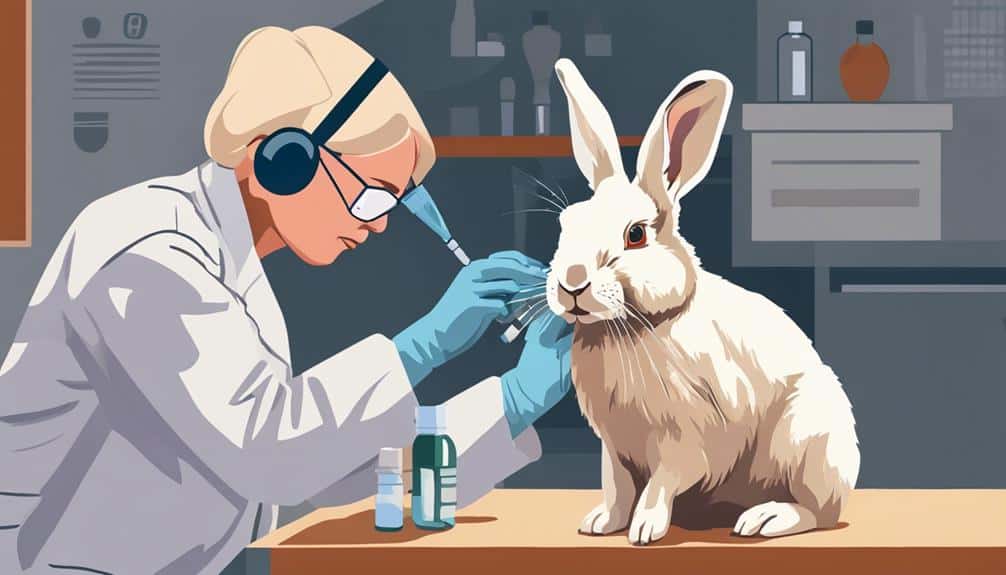
Ensuring your pet rabbit receives essential vaccinations is critical to safeguarding their health and protecting them from potentially deadly diseases. Key vaccines for pet rabbits include RHDV and RHDV2, vital in preventing diseases like Rabbit Hemorrhagic Disease. Myxomatosis vaccination is particularly important for rabbits in the UK and Europe.
Additionally, vaccines for Rabies and Pasteurella may be recommended to maintain your rabbit's health. It's advised to start the initial vaccination regimen for kits at 10-12 weeks of age to provide them with early protection.
Following the initial vaccination, regular boosters are necessary, typically every 12 months, and sometimes every 6 months, to ensure continued immunity against these diseases. By staying up to date with these vaccinations, you can help your beloved rabbit live a healthy and happy life free from the risks of these dangerous illnesses.
Establishing a Rabbit Vaccination Schedule
When establishing a rabbit vaccination schedule, consult with a knowledgeable vet specializing in rabbit care to determine the best course of action for your pet's health. Your rabbit's well-being depends on a proper vaccination schedule that aligns with their specific needs and lifestyle. Here are some essential points to take into account:
- Start Early: Begin the vaccination schedule with the first shot at 10-12 weeks of age to provide early protection against common diseases.
- Regular Boosters: Boosters are essential to maintain immunity, typically required every 12 months, sometimes every 6 months, as advised by your vet.
- Consult a Rabbit-Savvy Vet: Seek guidance from a vet experienced in rabbit care to tailor a vaccination plan that suits your pet's individual requirements.
- Consider Risk Factors: Factors like regional strains and specific health risks in your area should influence your vaccination decisions; your vet will help you navigate these considerations effectively.
Vaccination Costs and Considerations
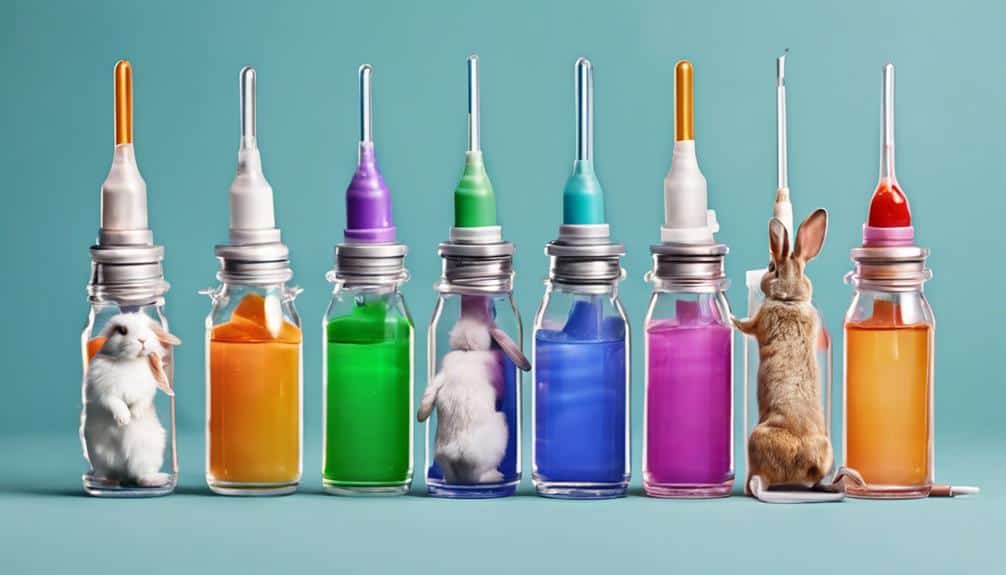
Considering the overall health and well-being of your pet rabbit, understanding the associated costs and key considerations related to vaccinations is essential for responsible rabbit care.
Rabbit vaccination costs typically range from $40 to $70 per shot, depending on the location and veterinary clinic. It's important to factor in additional expenses for checkups and physical examinations when budgeting for these vaccinations. Regular vaccines aren't only vital for your rabbit's health but also for maintaining the validity of pet insurance coverage.
The overall cost of vaccinations may vary based on the specific vaccines needed and the regional prevalence of diseases. To guarantee the best care for your pet, consult a rabbit-savvy vet to discuss the vaccination schedule and associated costs tailored to your pet rabbit's individual needs. By staying informed about vaccination costs and consulting with a knowledgeable veterinarian, you can provide excellent protection for your beloved rabbit while managing expenses effectively.
Which vaccinations are necessary for child-friendly bunny breeds?
In 2024, pet owners should ensure child-friendly bunny breeds receive vaccinations against myxomatosis and viral hemorrhagic disease, both of which are vital to safeguard these gentle companions. Regular vet check-ups remain essential to maintain the health of childfriendly bunny breeds in 2024.
Frequently Asked Questions
What Vaccines Do Domestic Rabbits Need?
To protect your rabbit's health, guarantee Rabies prevention and vaccinations against infectious diseases are prioritized. Follow a vaccine schedule for a strong immune response, contributing to herd immunity. Regular veterinary care maintains your rabbits' health.
What Is the 3 in 1 Vaccine for Rabbits?
When it comes to your pet rabbit's health, the 3 in 1 vaccine is a lifesaver. Protecting against deadly diseases like RHDV and Myxomatosis, this shot streamlines the vaccination process, ensuring robust immunity.
What Is the All in One Vaccine for Rabbits?
For your pet rabbit, the all-in-one vaccine provides crucial protection against Myxomatosis and Rabbit (Viral) Haemorrhagic Disease. This vaccine schedule guarantees yearly boosters for immunity, safeguarding your furry friend's health. Consult a vet for guidance on vaccination plans.
Do I Need to Vaccinate My Indoor Rabbit?
You absolutely need to vaccinate your indoor rabbit. Safeguard their health with preventive care. Even indoors, diseases can harm them. Consult a vet for a tailored vaccination plan. Guarantee your indoor pets have the best rabbit immunity.
Conclusion
In the intricate tapestry of rabbit care, vaccinations are the shining armor that protects your furry friend from the unseen dangers lurking in the shadows.
Just as a knight must wield a sword to defend their kingdom, you must arm your beloved bunny with the shield of preventive measures.
Let these vaccinations be the beacon of hope, guiding your pet towards a long and healthy life in the kingdom of pet ownership.


